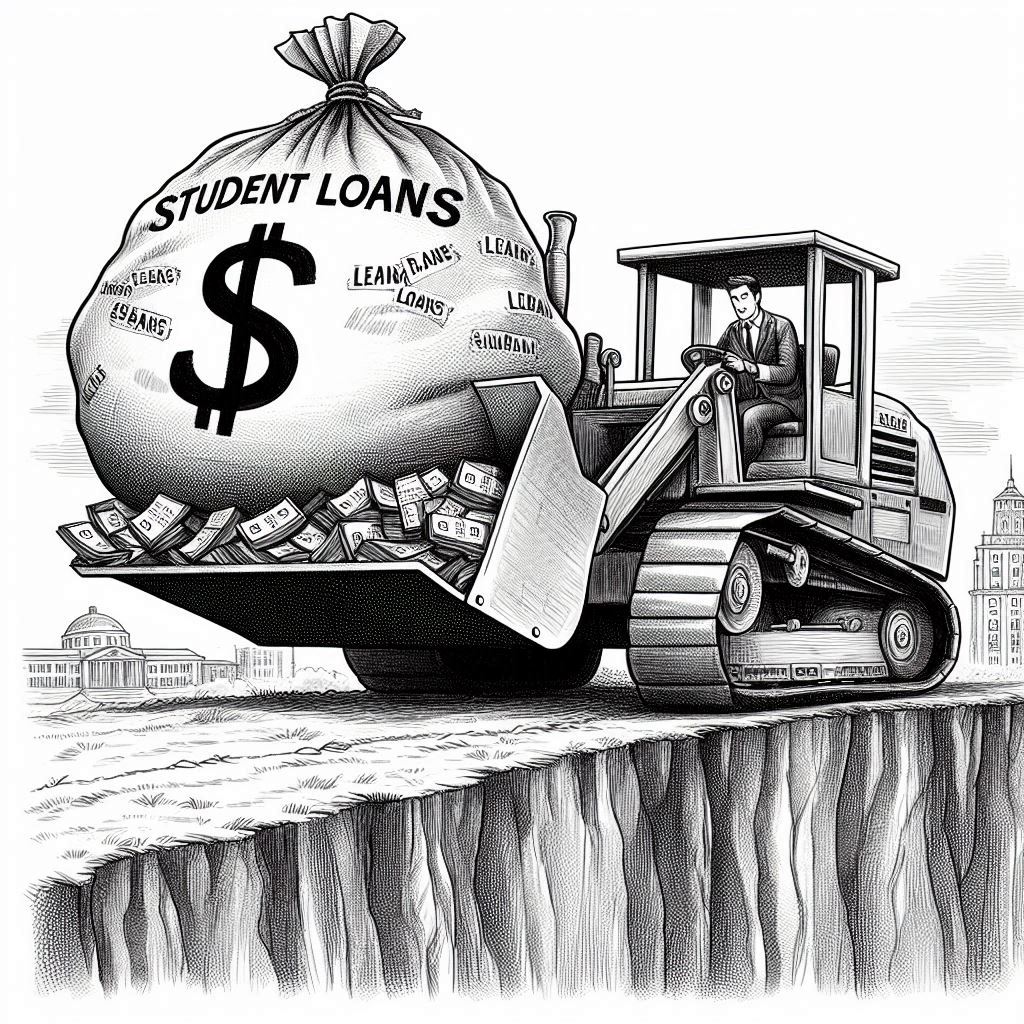By Darren Johnson
Campus News
Earlier this summer, the Biden administration sent a mass email to millions with student loan debt that the President was seeking to eliminate that debt. However, by the end of the summer, the Supreme Court had shut down that plan. Could it come back before Biden leaves office in January?
A recent court ruling says YES.

I spoke with Jack Wallace, Director of Government & Public Affairs, a Phoenix-based private student loan refinance company. With over 40 years of experience in corporate, education, and housing finance, he has and continues to collaborate with clients and the financial community to develop debt and equity funding sources for new and existing asset classes and businesses. He has completed over $13 billion in financings as an investment banker, financial advisor, and corporate finance executive.
Here is our conversation, which took place before the US Supreme Court rendered its decision against Biden’s plan. Perhaps it still can move forward, though. Wallace helps shed light on where we are right now.
Wallace on the likelihood that the Biden Federal Student Loan Forgiveness Plan will go into effect before Inauguration Day given that the SAVE Plan has been blocked by Federal Courts
Wallace: Within the last two months, two Federal District Courts and a Federal Appeals Court have put in place temporary stays, and then a preliminary injunction, respectively, regarding the SAVE Plan, blocking implementation of the Plan until the case is heard by the Appeals Court. However, last week the U.S. Department of Education filed an appeal with the U.S. Supreme Court asking the Court “to reverse the injunction and allow the SAVE plan to be implemented” while the legal challenges wind their way through the courts.
As of today, the Supreme Court has not responded to the Department’s request. The Supreme Court is not currently in session and will not be until it begins its new term on October 1st. It is unlikely, although they could issue a statement, that the Supreme Court will issue any rulings on the case. Therefore, it is unlikely that the SAVE Plan will be reinstated, and/or that Federal Student Loan forgiveness will be granted until the matter is resolved in the Federal courts.
So, it is highly doubtful that forgiveness will be granted prior to the impending change at 1600 Pennsylvania Avenue at noon on January 20, 2025.
Wallace on Trump’s possible presidential win
Wallace: In a second Trump administration, one might see targeted plans for Federal Student Loan debt relief rather than widespread forgiveness, similar to what he did in his first administration when the COVID pandemic started.
In March 2020, President Trump signed the CARES Act and implemented an Administrative Forbearance program that suspended principal payments and waived interest payments for all Federal Student Loan borrowers. This program was extended multiple times by the Biden administration and finally expired in October 2023 when Federal Student Loan borrowers were required to start making their monthly payments of principal and interest again.
Wallace on the amount of student loans that students can expect to be forgiven
Wallace: Right now, there is no one answer. Depending upon the final decisions rendered in the various Federal court cases, as well as the Administrative Rulemaking by the Biden Department of Education, and the Office of Management & Budget, it is anyone’s guess.
Wallace on Biden’s power to forgive student loans
Wallace: On June 30, 2023, in a 6-3 decision, the U.S. Supreme Court told the Biden Administration that they did not have the authority to forgive Federal Student Loans and struck down the plan. The Court determined that neither Biden nor his Department of Education had the authority in general, and under the HEROES Act as the Department claimed, in particular, to do so. It further stated that “Congress hadn’t delegated their authority to an administrative agency and that the Biden Administration has gone far and beyond what Congress could reasonably be understood to have granted.”
Wallace on the similarities with the complaints that the Paycheck Protection Program (“PPP”) loans were forgiven
Wallace: PPP loans were issued by the Small Business Administration. The PPP was specifically contained in the CARES Act of 2020 passed by Congress and signed into law by President Trump.
Authorization for the Biden Forgiveness Plan was not contained in the CARES Act despite what the Biden Administration claimed which is why the Supreme Court ruled against the Biden Administration in their 6-3 decision on June 30, 2023. The Higher Education Act of 1965, as amended, is what needs to be amended by Congress and signed by the President for a widespread forgiveness plan like Biden’s to be authorized. Or stand-alone legislation authorizing such a forgiveness program needs to be passed by Congress and signed by the President.
Wallace on the included students in the loan forgiveness program
Wallace: If your Title IV school closed and you didn’t finish your degree, and if you didn’t opt in to a “teach-out plan” where you transfer and complete your degree, you can apply to the U.S. Department of Education to have your loans discharged under the “closed school loan discharge plan.”
Regarding the issue of a student seeking debt relief due to a college not delivering what the college promised the student, the U.S. Department of Education is rumored to be considering some relief plan through their Proposed Ruling Making Process this Fall. Stay tuned.
On the amount of debt based on age
Wallace: Statistics from 2024 suggest that 3.5 million out of 46 million Federal Student Loan borrowers over the age of 60 have Federal Student Loan debt. Their average balance is $41,357 compared with 25-34 year olds that have $33,081. (Source: Education Data)
Wallace on borrowers who did not have great pay-off career-wise
Wallace: Regarding the issue of a borrower seeking Federal Student Loan debt relief due to taking out Federal Student Loans for majors that did not pay off career-wise, this raises questions of who is at fault? Did the borrower pick a major that did not pay well after they graduated from a high-priced college and now that the loans are due the borrower has “borrower’s remorse,” or was there more to it? Again, the U.S. Department of Education is rumored to be considering some relief plan through their Proposed Ruling Making Process this Fall.
Wallace on whether students should stop paying Federal Student Loans
Wallace: No. Pay the Federal Student Loan back. They signed a promissory note when they got the loan so legally, they are on the hook to pay the loan back until they get a legal document from the U.S. Department of Education or their Servicer of the loan that says their loan has been discharged or forgiven. Even though Federal Student Loan borrowers were supposed to start making payments last October, approximately 50% are still not making payments as of June 2024. Whether this is because they think their Federal Student loans are going to be forgiven, or because their credit score is not being pummeled for nonpayment since the U.S. Department of Education is not currently reporting delinquencies to the credit bureaus, the loans are still accruing interest since September 2023. Also, effective October 1st, the Department will begin reporting delinquencies to the credit bureaus and this will negatively impact the borrowers’ credit score.
Wallace on whether former students should pay back their alleged predatory loans
Wallace: Most people do not realize that since July 1, 2010, the U.S. Department of Education has been the sole lender for Federal Student Loans. The U.S. Treasury borrows the money by issuing debt in the Treasury market backed by the full faith and credit of the United States. Then the Department of Education makes a fixed, market rate of interest Federal Student loan to the borrower regardless of the borrowers’ credit or credit score, so they can pay for their college tuition bill. I would hardly call that predatory lending. And if it were, the Federal regulators such as the Consumer Financial Protection Board, the Federal Trade Commission, and the State Attorneys General, and Consumer Finance Departments would be all over the U.S. Department of Education and the U.S. Treasury on behalf of the borrower.








Facebook Comments